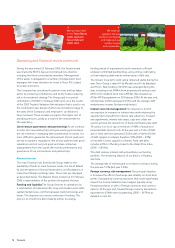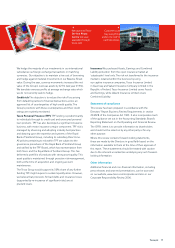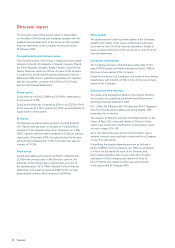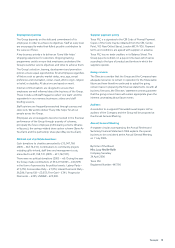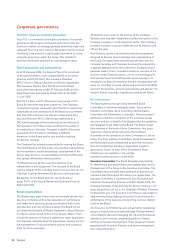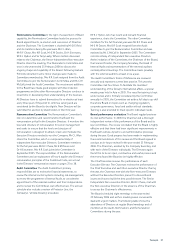Tesco 2006 Annual Report Download - page 28
Download and view the complete annual report
Please find page 28 of the 2006 Tesco annual report below. You can navigate through the pages in the report by either clicking on the pages listed below, or by using the keyword search tool below to find specific information within the annual report.26 Tesco plc
Directors’ remuneration report continued
Weremain committed to driving strong financial performance
and during the year the Committee reviewed the level of
reward and emphasis on performance. The review took into
account the international nature of the business and the need
to incentivise Executive Directors to continue to drive forward
future growth and international expansion plans. It also
considered the high regard in which the Tesco management
team is held in the market and the concern this poses about
retaining them at a crucial time in the Group’s growth. The
Committee is mindful of the need to ensure that the talented
management team is competitively rewarded to retain their
skills and experience in order to drive forward further value
growth for Tesco shareholders.
As a result the Committee made a number of changes to
ensure that the total remuneration package remains
competitive compared to the market and to increase the
overall emphasis on performance. In doing so the Committee
has maintained the balance between short-term and long-
term remuneration, but with a greater emphasis on shares.
This has been achieved by increasing the maximum that can
be earned under the deferred share element of the annual
bonus as well as providing Executive Directors with the
opportunity to earn additional shares under the Performance
Share Plan if performance exceeds the upper levels of the
Return On Capital Employed (ROCE) performance hurdles.
The Company operates in a highly competitive retail
environment. Business success depends on the talents of the
key team, but outstanding business performance comes from
teamwork. Building and retaining that team at senior levels
within the Group is vital to success. The Committee also
ensures that the remuneration relationship between the
Executive Directors and senior executives of the Company
below this level is appropriate. In particular, any exceptional
remuneration arrangements for senior executives are advised
to the Committee.
Total remuneration
The total remuneration levels of Executive Directors are
reviewed annually by the Committee. The Committee considers
external independent remuneration surveys to ensure it has
proper regard to competitive market practice. We are conscious
of the risks involved in paying unjustified amounts and
therefore monitor carefully the basic salary and total
remuneration that each Director receives.
The total Executive Directors’ remuneration package comprises
the following elements:
• base salaries determined by the responsibilities, skills
and experience of the individual against a benchmark
determined by reference to other large retailers, major FTSE
100 companies and certain major consumer companies
operating internationally;
• annual bonuses paid part in cash and part in shares with
acompulsory deferral of the share element for three years;
• long-term performance share plan based on a stretching
three-year ROCE target. Shares must be held for a further
12 months after vesting;
• performance-related share option awards via the Share
Option Scheme open to all senior managers;
• benefits (which comprise car benefits, chauffeurs, life
assurance, disability and health insurance, gym/leisure club
membership and staff discount); and
• pensions.
Executive Directors are also eligible to participate in the
Company’s all-employee savings related share option scheme
(SAYE), Shares in Success and Buy-As-You-Earn schemes on
the same terms as all other UK employees.
Basic pay
Basic pay must be appropriate to attract and retain talented
individuals. It must reflect individual capability, and any
changes in responsibilities as the Company faces new
opportunities and challenges. As the Company continues
to diversify into new product areas and services, as well as
expand internationally, the Committee seeks to reflect this in
the benchmarks that are used. We aim to reflect salary levels
at the top performing retailers, the leading FTSE companies
as well as to give consideration to international competitors
in order to attract the best people and maintain excellent
performance. We also take into account pay conditions
throughout the Company in deciding annual salary increases.
Annual cash bonus and deferred annual bonus
The Company operates an annual bonus scheme based on
achievement of stretching earnings per share (EPS) targets,
assessment of total shareholder returns (TSR) and specific
corporate objectives. The Committee sets performance targets
annually and confirms achievement of performance and awards
to be made. Executive Directors can earn up to 100% of salary
paid in cash at the end of the year and a maximum of 100%
of salary paid in shares with compulsory deferral for three
years. The share element for the 2004/05 award was delivered in
the form of nil-cost share options. The cash element is earned
through achievement of previously agreed EPS growth targets
and progress on specific corporate objectives.
It is not possible to disclose future targets for reasons of
commercial sensitivity. By way of illustration of the approach
taken on target-setting, the corporate objectives are based on
our balanced scorecard, the Steering Wheel, described in more
detail on page 22. The objectives in the ‘Finance’ segment
include increasing sales from new space, specific profit targets
for international businesses and for retailing services. The
‘Customer’ segment objectives include like-for-like sales growth
and development of the non-food business. The ‘Operations’
segment includes strategic objectives focussed on areas such
as international growth and operating safely and responsibly in
every country. The ‘People’ segment objectives relate to talent
management and capability.


